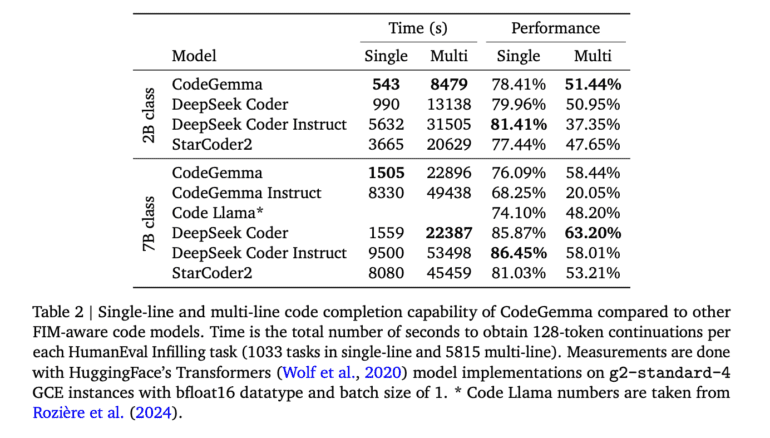- Google introduced CodeGemma, a suite of large language models (LLMs) tailored for code generation, understanding, and instruction adherence.
- CodeGemma comprises three distinct models: 2B Base Model for rapid code completion, 7B Base Model integrating code infilling with natural language processing, and 7B Model for Instruction Adherence facilitating conversational interactions around code.
- Each model is built on Gemma’s strengths and trained on an additional 500 billion tokens spanning languages, mathematics, and coding syntaxes, enhancing proficiency in logical and mathematical reasoning.
- Exceptional performance across various programming languages, demonstrated by stellar results on benchmarks like HumanEval and MultiPL-E, establishes CodeGemma’s versatility and effectiveness.
- The launch of CodeGemma fosters collaborative innovation within the developer community, providing open access to advanced tools, inspiring exploration, and empowering developers to redefine software development boundaries.
Main AI News:
In a momentous fusion of artificial intelligence and software engineering, Google has launched CodeGemma, an innovative suite of large language models (LLMs) tailored for code generation, understanding, and instruction adherence. Positioned to democratize top-tier code assistance tools, CodeGemma represents a significant leap forward in AI-driven programming support.
Exploring the CodeGemma Suite
CodeGemma emerges as a set of accessible iterations derived from the Gemma model, finely calibrated to tackle coding challenges with precision. This comprehensive suite encompasses three distinct models:
- 2B Base Model: Engineered for rapid and efficient code completion, prioritizing speed and privacy preservation, catering to scenarios demanding swift resolutions.
- 7B Base Model: Seamlessly integrating code infilling with natural language processing, enhancing its capabilities in code completion, understanding, and language generation tasks.
- 7B Model for Instruction Adherence: Facilitating conversational interactions around code, programming, and mathematical concepts, serving as an indispensable resource for developers seeking guidance.
Elevating Performance and Accessibility
Each model within the CodeGemma suite leverages Gemma’s foundational strengths, augmented by extensive training on an additional 500 billion tokens spanning languages, mathematics, and coding syntaxes. This rigorous training regimen endows CodeGemma with unparalleled proficiency in logical and mathematical reasoning, setting new standards in code generation and completion.
The 7B model demonstrates exceptional performance across a spectrum of programming languages, including Python, Java, JavaScript, and C++. Its efficacy is underscored by stellar performance on benchmarks like HumanEval and MultiPL-E, solidifying its versatility and effectiveness, as evidenced by its top-ranking position on the GSM8K evaluation.
Fostering Collaborative Innovation
Beyond its technological prowess, the launch of CodeGemma signifies a call for collaborative innovation within the developer community. By granting open access to these advanced tools, Google aims to inspire exploration and creativity, empowering developers to redefine the boundaries of software development.
Assessing the Impact of CodeGemma
The introduction of CodeGemma has ignited excitement and anticipation within the AI and development domains. Its remarkable performance across established benchmarks like HumanEval and MultiPL-E highlights its potential to revolutionize code generation and comprehension.
Furthermore, the inclusion of the Instruction Adherence model (CodeGemma 7B Instruct) promises to redefine developer-AI interactions, fostering intuitive conversations and potentially simplifying the learning curve for new programming languages and concepts.
Conclusion:
The introduction of CodeGemma represents a significant advancement in AI-driven programming support, poised to revolutionize code generation, comprehension, and collaboration within the developer community. Its exceptional performance and open-access approach signify Google’s commitment to driving innovation and empowering developers worldwide, potentially reshaping the landscape of software development tools and practices.

